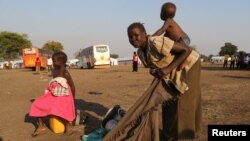The British government must take urgent action to help end the "horrendous crisis" in South Sudan, where men have been castrated in fighting and women have drowned hiding from militias, UK lawmakers said in an open letter on Wednesday.
Africa's newest nation plunged into civil war in December 2013 after a long-running feud between President Salva Kiir and his former deputy, Riek Machar, exploded into violence, much of it along ethnic lines.
The pair signed a shaky peace deal last year, but fighting has continued forcing more than 1.1 million people to flee in the biggest cross-border exodus from any central African conflict since the 1994 Rwandan genocide.
"All sides ... have been complicit in the killing or castration of men and boys," wrote Stephen Twigg, chair of the International Development Committee, a parliamentary watchdog. "These are horrendous acts of violence added to a litany of other sexual and gender based violence, already endemic in South Sudan."
Addressing his letter to the Department of International Development (DFID) and the Foreign Office, Twigg said he was shocked at the "alarming numbers" of civilians displaced or who have fled to neighboring countries because of the violence.
"Women with their babies drowning on their backs, hiding in the swamps as militia go past. That fear is so desperate that they are hiding underwater," he wrote, quoting an Oxfam humanitarian advisor.
DFID said it had this year pledged 103 million pounds ($127.06 million) to provide food, water and health services to more than 500,000 South Sudanese.
"The world is not looking the other way whilst the people of South Sudan suffer," a DFID spokesperson said in a statement to the Thomson Reuters Foundation.
In an opinion piece published on a government website on Wednesday, Foreign Office minister Tobias Ellwood called the leadership in South Sudan an "abject failure".
"The international community expects them to do all that they can to stop the violence and get the peace process back on track," Ellwood wrote after his first visit to South Sudan.
"There can be no military solution to the current crisis. A political agreement, difficult as this is to achieve and make work, is the only viable way forward."
The International Development Committee urged the UK government to help establish a U.N. force in the region, and to push the humanitarian crisis up the international agenda.
On Monday, the United Nations Secretary-General Ban Ki-moon said he feared genocide was about to start in South Sudan unless immediate action was taken.
Last week, the head of a U.N. human rights commission called for the deployment of a 4,000-strong protection force across South Sudan to stop a "Rwanda-like" genocide, and a court to be set up to prosecute atrocities.
Some 800,000 people were killed in the Rwandan genocide by Hutu extremist militiamen from country's biggest ethnic group.
($1 = 0.8106 pounds)











